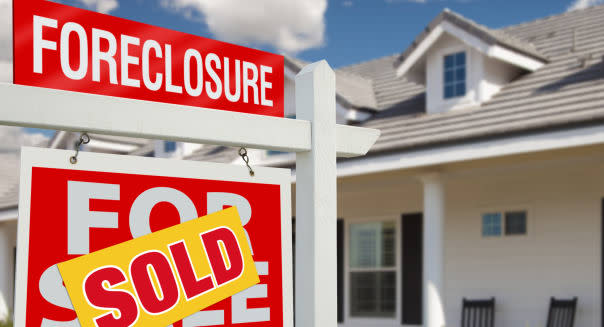Is Foreclosure Investing for You?

Almost 1.2 million properties in the country are in some form of foreclosure, according to RealtyTrac, and there lie opportunities for the savvy investor.
The fact that a property is a foreclosure doesn't make it a good or a bad deal. A foreclosure is just a legal process that transfers title from the owner back to the lender due to nonpayment of the debt obligation. There are four main stages:
The pre-foreclosure stage usually begins when the first payment is missed from the borrower to the lender. That official clock starts with the notice of default. During this stage, you would buy from the owner and not the bank.
The foreclosure auction stage is also called the sheriff sale or trustee sale, depending on if you live in a mortgage state or a trust deed state. The process is usually four to six months along, and the property goes to the highest bidder at a public auction, usually for all cash.
Many states have a redemption stage, where the borrower can pay off the balance on the mortgage (or an amount agreed to by the lender) and get the property back out of foreclosure. This stage requires you to buy from the owner and not the lender.
The bank-owned stage is also known as real estate owned. Nobody has won the bid at the auction (usually nobody bid), so the property reverts back to the lender, which can sell it to a private owner, either as an owner occupant or an investor.
Each stage offers a chance to buy a bargain property -- and a different strategy. Let's assume you find an opportunity to buy a property that is worth $100,000 for $70,000. Here's what you need to know:
There is also always risk when you invest in anything, and the way to lessen the risk is to be educated. Many quality books and seminars are available. Unfortunately there are also overpriced packages sold by some people who have never really done much foreclosure investing.
Verify the after-repaired value of the property. This is done with comparable sales from the multiple listing service, online services such as Zillow (Z) or a list of recent sold comparable sales from broker or title company. One of my earliest mentors told me "until you know value, you know nothing."
Have a good idea of the cost of your funds, closing costs, repair costs, maintenance, utilities and selling or leasing costs. If you don't account for those, you are in for a poor investment decision.
Understand your exit strategy (a lease or sale) and rehabilitate accordingly. A home kept for rental should not be as heavily repaired as a flip house.
Understand that you will rehab for profit, not for a "flip this house" series.
Understand the timetable of your state foreclosure process.
Decide which stage of the foreclosure process you will focus on. Generally, to save time and leverage other people's assets, that will be the real estate owned, or bank-owned phase. In this stage, you will almost always deal with the REO agent who is generally a real estate agent with a niche business in dealing with banks to sell their foreclosure inventory. Develop a great relationship with the REO agent because they can be a constant source of good deals for your investment portfolio.
There are also several important don'ts.
Don't take any broker's or seller's word for the condition, comparable homes or clear title. Get pros to help you. As Ronald Reagan famously said, "Trust but verify."
Don't get emotionally attached to any real estate investment even if it is a foreclosure. Investing successfully in real estate is about numbers and nothing more.
Don't spend all your time on one prospect. Make several offers at once and word your agreements with an easy out clause if you get more than one accepted (or be prepared to buy more than one).
Don't forget you must know more than the other professionals involved to be successful. I know how to finance a property dozens of ways, so many times I can see a deal where many others don't because they only know one or two ways.
%VIRTUAL-article-sponsoredlinks%Real estate investing, and more specifically foreclosure investing, is a unique opportunity to acquire hard assets for deep discounts picking up instant equity that has the chance to grow or you could choose to convert to cash as fast as possible.
Learn a valuable lesson from the last real estate crash and don't over-leverage properties. If you get stuck in another market crash, you could be on the hook with over-leveraged properties sucking your dry. Cash is king, but right behind that in real estate is "equity position."
With some good education, foreclosure investing might be a great add-on to your wealth building efforts. Not everyone is wired to be a real estate investor but if you think you are move forward with education and action.
John Jamieson is the best-selling author of "The Perpetual Wealth System." Follow him on Facebook and Twitter.

